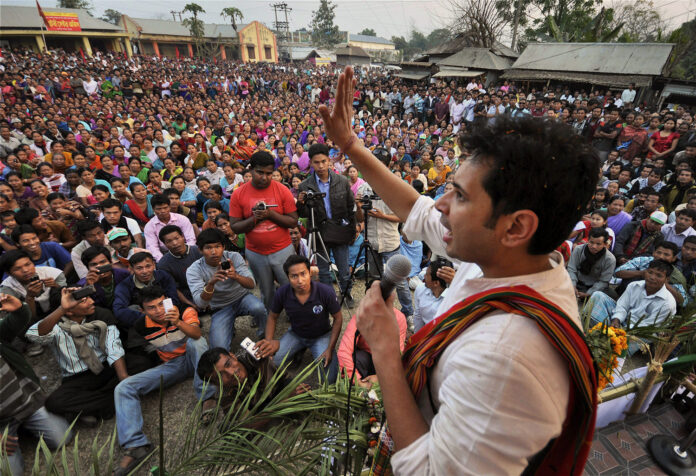Pradyot Kishore Manikya Debbarma, the royal scion of Tripura, made a bold and provocative statement on Thursday. He claimed that India possesses enough power to divide Bangladesh and create a new country. This declaration has sparked significant reactions, drawing both attention and criticism from various political circles and the public alike.
Pradyot Debbarma is no stranger to controversy. As a prominent leader in Tripura, he often speaks candidly on issues of regional politics and identity. His latest remarks, however, touched on the sensitive subject of India’s geopolitical strength and its relationship with neighboring Bangladesh. According to Pradyot, India’s influence in the region is so great that it could, if it chose to, reshape the political landscape by fragmenting Bangladesh and forming a new nation. He pointed out that India’s military, economic, and political prowess gives it a unique ability to make such decisions, should the need arise.
His comments have not gone unnoticed. Critics immediately condemned his statement, arguing that such rhetoric could inflame tensions between India and Bangladesh. While India and Bangladesh share a complex history, marked by the 1971 Liberation War, relations between the two countries have been largely stable in recent decades. Pradyot’s remarks, however, raised concerns about how these comments might be perceived across the border.
Some political analysts suggest that Pradyot’s comments should be viewed in the context of his broader political agenda. As a leader of the indigenous Tripuri community, he has long advocated for the rights and recognition of his people. His comments could be seen as an attempt to highlight the strategic importance of the region and India’s dominance over neighboring countries. Tripura, which shares a long border with Bangladesh, is geographically and politically significant in this context.
However, the potential diplomatic fallout from such statements cannot be ignored. India’s relationship with Bangladesh has grown over the years, with both nations collaborating on several key issues, from trade to security. Any suggestion that India might consider dividing Bangladesh risks stirring tensions in a region that has worked hard to maintain peace. Bangladesh, a nation that emerged after a bloody war of independence in 1971 with India’s help, is unlikely to take kindly to such statements, even if they do not reflect official policy.
On the other hand, Pradyot’s supporters argue that his statement was meant to highlight India’s strength and influence in the region, rather than as an actual call for division. They view his remarks as a reflection of India’s ability to shape regional politics, and a reminder of its dominant position in South Asia. For them, Pradyot was emphasizing the need for India to assert its leadership more decisively, particularly in regions like the Northeast, which often feel neglected in the national political discourse.
Despite the backlash, Pradyot has stood by his comments, insisting that he was merely stating a fact about India’s power in the region. He stressed that his remarks were not intended to create diplomatic friction but rather to spark a discussion about India’s role in the neighborhood. Pradyot argued that it is important for India to recognize its capabilities and be aware of the influence it wields in South Asia, particularly in its border regions.
As the royal scion of Tripura, Pradyot has long been a vocal advocate for his people and their rights. His political journey has often seen him speaking out on issues of identity, regional autonomy, and the challenges faced by the indigenous communities in the Northeast. His statement on Bangladesh may have been intended to draw attention to the strategic importance of the region, but it also reveals the complex nature of India’s regional politics.
Whether Pradyot’s remarks will have any lasting impact on India’s relationship with Bangladesh remains to be seen. However, it is clear that his statement has brought to the fore questions about India’s role in South Asia and how it balances its relationships with neighboring countries. In a region that has historically been fraught with tensions and conflicts, statements like these can easily become flashpoints for larger debates about sovereignty, influence, and regional stability.
Pradyot’s bold claim has added another layer to the political conversation in the Northeast and beyond. As India continues to navigate its role as a regional power, voices like Pradyot’s, whether controversial or not, will likely continue to play a role in shaping public discourse. His comments have certainly sparked discussion about India’s strength, its relationship with its neighbors, and the delicate balance of power that defines South Asia.




